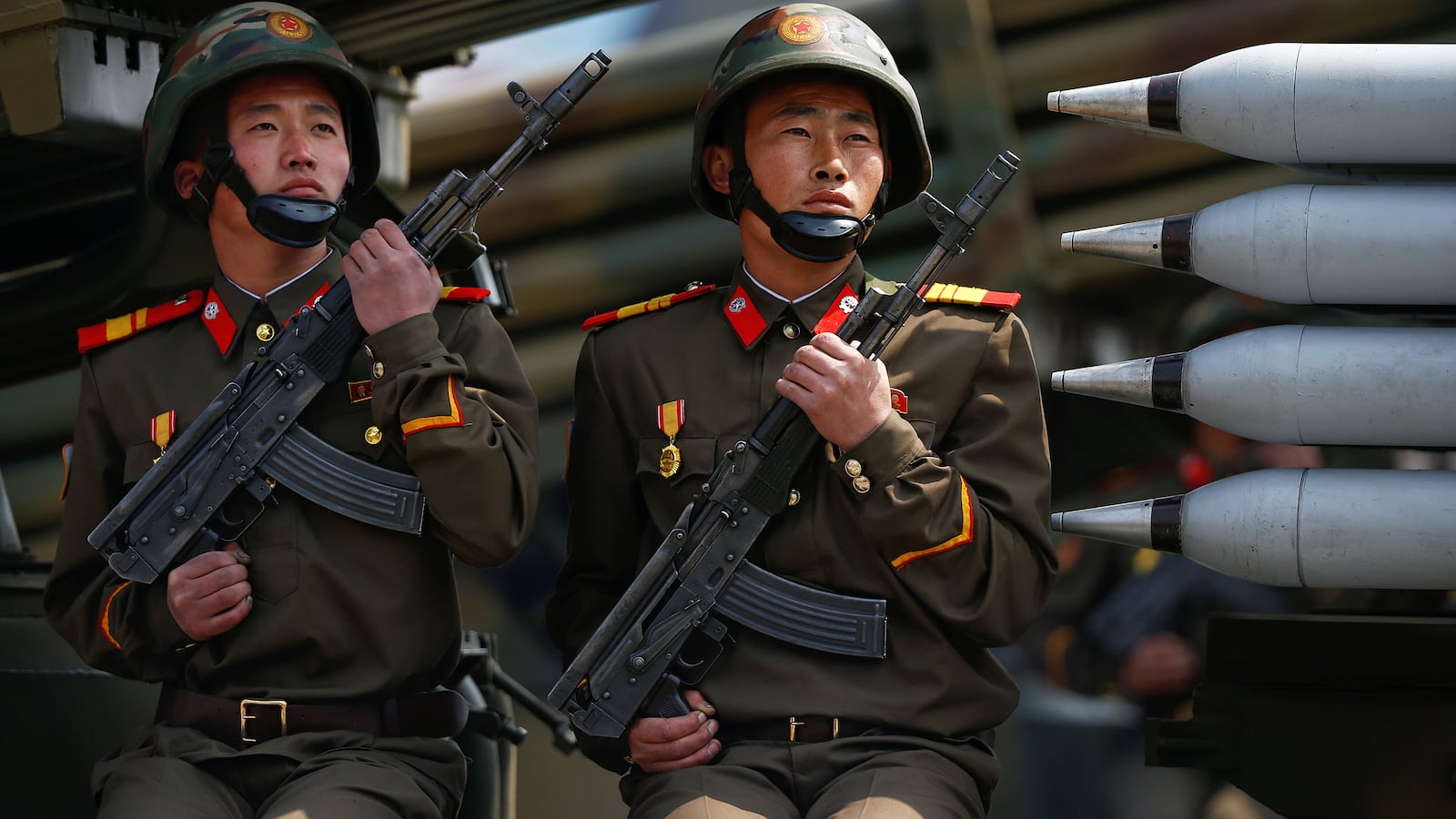Several media outlets have reported that Gen. Joseph Dunford, chairman of the Joint Chiefs of Staff, said over the weekend that war with North Korea was not “unimaginable.” What has gone unreported is that he also suggested the administration is giving diplomacy only “a few more months.”
Dunford’s comments, sure to be heard in Beijing and Pyongyang, come as the Trump administration is hinting, with various degrees of subtlety, that it is willing to kill Kim Jong Un, the North Korean despot.
First, Dunford. “As I’ve told my counterparts, both friend and foe, it is not unimaginable to have military options to respond to North Korean nuclear capability,” he said at the Aspen Security Forum in a conversation with NBC’s Andrea Mitchell. “What’s unimaginable to me is allowing a capability that would allow a nuclear weapon to land in Denver, Colorado. That’s unimaginable to me. And so my job will be to develop military options to make sure that doesn’t happen.”
Headline grabbing? Yes. Groundbreaking? Not really.
Many analysts and officials, especially after the July 4 test of an intercontinental ballistic missile, have said Kim cannot be allowed to develop the capability to nuke the American homeland.
Far more important is what Dunford said next. Mitchell mentioned that at another Aspen session James Clapper, the former director of national intelligence, said that Kim would never give up his nuclear weapons. Dunford responded this way:
“I think that has certainly been conventional wisdom. When Secretary [of State Rex] Tillerson came in, in the intelligence communities the general assessment was, and it has been public, that Kim Jong Un views his existence as inextricably linked to nuclear weapons and China will never cooperate. So those are the two things that everybody has basically said. That’s conventional wisdom of North Korea. So where does that leave us? Leaves us what, to a military option.”
And then came the lines probably intended more for Chinese and North Korean ears than American ones:
“So I think for all of us, we should give Secretary Tillerson full support in attempting to resolve this diplomatically and economically even as we recognize that it may not happen, and there may have to be a follow-up option, which is the military option. We can wring our hands and say it will never happen or we can roll up our sleeves and make an effort to have a concerted economic and diplomatic plan that does cause KJU, Kim Jong Un, to come to the table and begin to have a conversation, at least stop the path that he’s on right now, which is further development of intercontinental ballistic missiles and nuclear capability, and to me it makes all the sense in the world to prove the theory of the case and to work this for a few more months.”
Dunford’s comments about timing do not appear to be a slip of the tongue. He also made it clear, at the beginning of his conversation with Mitchell, that time was in short supply. “North Korea today, from a ‘sense of urgency’ perspective, would be our number one challenge,” he said in remarks the Defense Department highlighted in its account of the Aspen event.
So what happens in “a few more months”?
On Thursday at Aspen, CIA Director Mike Pompeo made the audience gasp—I was there for both his and Dunford’s remarks—with these comments:
“It would be a great thing to denuclearize the Peninsula, to get those weapons off of that, but the thing that’s the most dangerous about it is the character who holds the control over them today. So from the administration’s perspective the most important thing we can do is separate those two, separate capacity and someone who might well have intent and break those two apart, and I’m confident that the intelligence community will present a set, a wide range of options for the president about how we might go about that.”
Pompeo later tried to walk back the threat of killing the North Korean leader, but he fumbled that effort.
Dunford and Pompeo spoke after U.S. officials leaked to the media that they had a clean shot on the Kimster on July 4, the day of the North’s initial flight test of the Hwasong-14, the country’s first proven intercontinental ballistic missile. American targeters, we learned, watched him smoke cigarettes and mill around the launch site for about 70 minutes, giving them a marvelous opportunity to end dynastic rule in the Democratic People’s Republic of Korea. This particular U.S. health warning—about puffing too long in one spot—did not come from the surgeon general.
Rodger Baker of Stratfor believes the Trump administration sent, in the words of Business Insider, two “powerful messages” with the leak. In comments to that site, he said that by not killing Kim, Washington was indicating it was not seeking regime change.
The second message is that there’s “no need to continue” the missile program. If the North insists on doing so, however, the U.S. is warning it can “strike it and Kim.” As Business Insider noted, on the following day the U.S. and South Korea engaged in a live-fire exercise “demonstrating they could have both killed Kim and stopped the launch.”
Maybe all these developments are coincidental, but it does appear the Trump administration is fast losing patience with Kim and, by implication, his friends in Beijing. After all, there seems to be concerted messaging.
So after the last several weeks of dire-sounding warnings, war on the Korean Peninsula appears not only imaginable but also close at hand.






